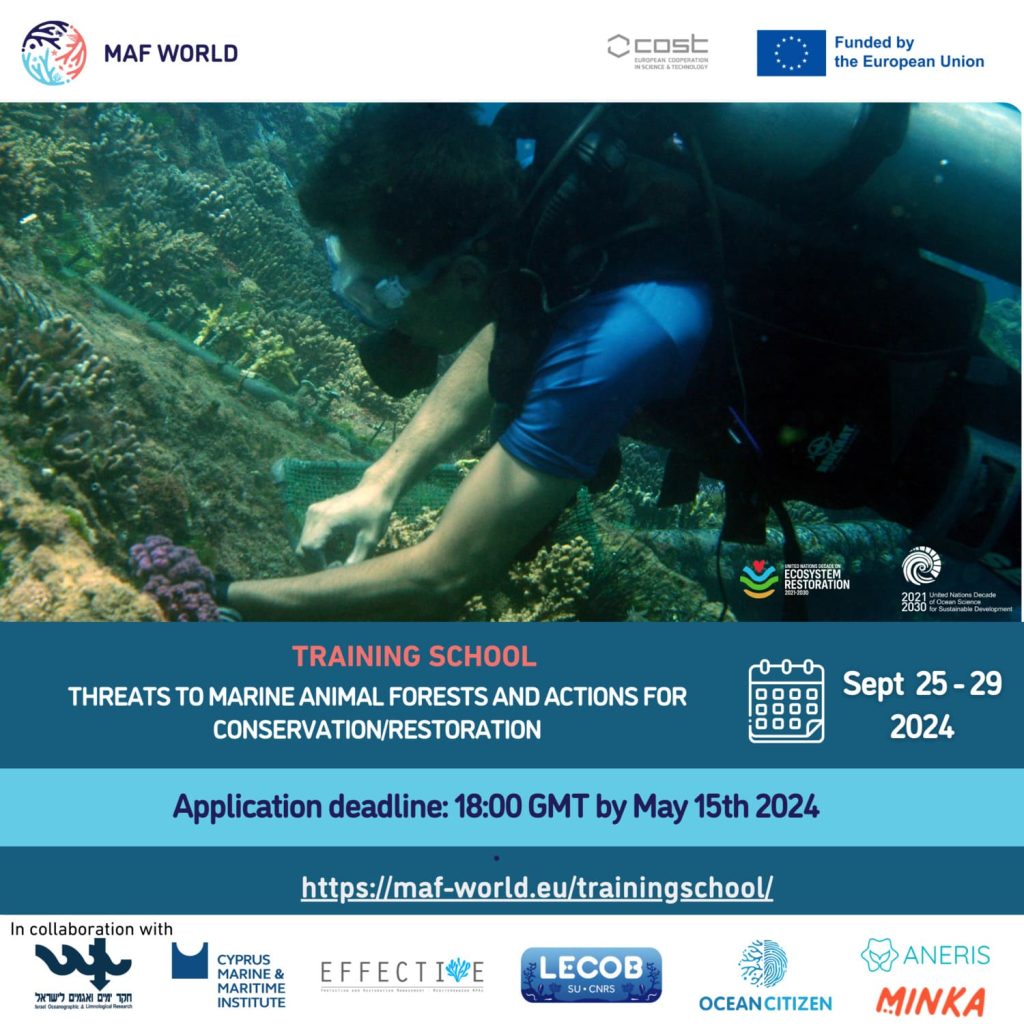MAF-WORLD training school on ‘Threats to Marine Animal Forests and actions for conservation / restoration’
Shared WG7 and WG3 activities
The MAF-WORLD COST Action organised the training school on “Threats to Marine Animal Forests and actions for conservation/restoration” as part of WG3 and WG7 activities
Aims and rationale: Despite numerous international initiatives like COP26, the Decade of Ocean Science for Sustainable Development (2021–2030), and the Ecosystem Restoration Decade, human activities persist in significantly altering marine ecosystems. Benthic ecosystems face threats from bottom trawling, urban and agricultural pollution, bioinvasions, climate change, and other human-induced pressures. Marine Animal Forests (MAFs), dominated by benthic suspension feeders such as sponges, hard corals, and gorgonians, constitute vulnerable three-dimensional habitats. These forests, spanning from coastal to deep-sea areas, are vital biodiversity hotspots, nursery grounds, and potentially significant providers of ecosystem services, particularly in carbon sequestration. However, crucial information regarding the distribution, population dynamics, connectivity, and ecosystem functioning of key marine animal forest species is lacking despite available technology for data collection. Anthropogenic disturbances jeopardise the ecological processes of marine animal forests and their services to human societies globally. The European Cooperation in Science and Technology, through the MAF World COST Action, looks to unify concepts and strategies for conservation, monitoring, and restoration globally. Protecting MAFs necessitates scientific, social, and political investment to expand our understanding and effectively manage these threatened habitats. Given their crucial role in maintaining planetary health, MAFs should be prioritised in conservation plans.
This training school will take place at the Observatoire Oceanologique de Banyuls, France, from 25 to 29 September 2024 (5 days, Wednesday to Sunday; arrival on Tuesday, 24/9; departure on Monday, 30/9). The program comprises 3 days of training sessions, including field and lab work, and 2 days of workshops, including a visit to a public aquarium and citizen science activities.
The lab sessions will cover lectures on MAF conservation and restoration, as well as hands-on activities such as fragmentation and micro-fragmentation strategies for MAF organisms, attachment techniques for fragments onto various substrates, ecological engineering approaches in MAF restoration, maintenance of in situ and ex situ facilities and nurseries, MAF transplantation concepts, and active/passive restoration methods. Participants will also conduct observations under microscopes to study MAFs behaviours (polyps in/out), feeding behaviours, polyp/surface calculations, estimation of colony fecundity/reproductivity potential, and photogrammetry (image collection and analysis).
Fieldwork will focus on newly developed methodologies for the conservation and restoration of red corals (Corallium rubrum), including cave diving visits (pending boat availability), collection methodologies for entire colonies/fragments, active outplanting of prepared specimens, field observations, and photography of C. rubrum habitats.
The training will also include essential information for citizen science as a tool for monitoring restoration efforts and the functioning of MINKA, a platform for citizen science.
The focus of the restoration workshop will be on engaging in discussions and drafting scientific manuscripts over the course of the final days, with the goal of developing the frameworks and initial drafts of these manuscripts. Participants will be divided into 3-4 groups, each overseen by a designated leader among the trainees, with mentors contributing to the discussions. These manuscripts will revolve around the overarching theme of ‘restoration methodologies’ and are intended to serve as chapters in an upcoming MAF book or as journal publications, aligning with the objectives of WG 7. Potential topics to explore include, but are not limited to: (a) various types and methodologies for coral nurseries, (b) different approaches and techniques for coral transplantation, (c) strategies for restoring gorgonians, and (d) methodologies used in the restoration of shallow Mediterranean corals. Prior to the workshop, participants are required to complete preparatory tasks, including reading and summarizing papers related to the suggested topics.
Application Deadline: May 15th – 2024
Travel grants: This training school is funded by the MAF-WORLD COST Action. Limited travel funding is available for members of the COST Action, and interested individuals are encouraged to refer to the website and Guidelines to verify eligibility and to find instructions for joining the Action. In general, travel grants are accessible to candidates affiliated with research organisations within the EU and associated countries. These grants cover round-trip travel expenses and per diem costs for a limited number of participants attending the workshop in person. Applicants seeking travel assistance should:
Enroll in the MAF-World COST action by joining one of its working groups here.
Submit their funding request via email, including a CV (1-2 pages) and a brief statement (> 200 words), outlining why they wish to participate in the training school and how they anticipate benefiting from it, to: Lorenzo Bramanti (lorenzo.bramanti@obs-banyuls.fr), Louis Hadjioannou (louis.hadjioannou@cmmi.blue) and Buki Rinkevich (buki@ocean.org.il).
Notification of acceptance: Successful applicants will be notified by email by June 15th, 2024.
